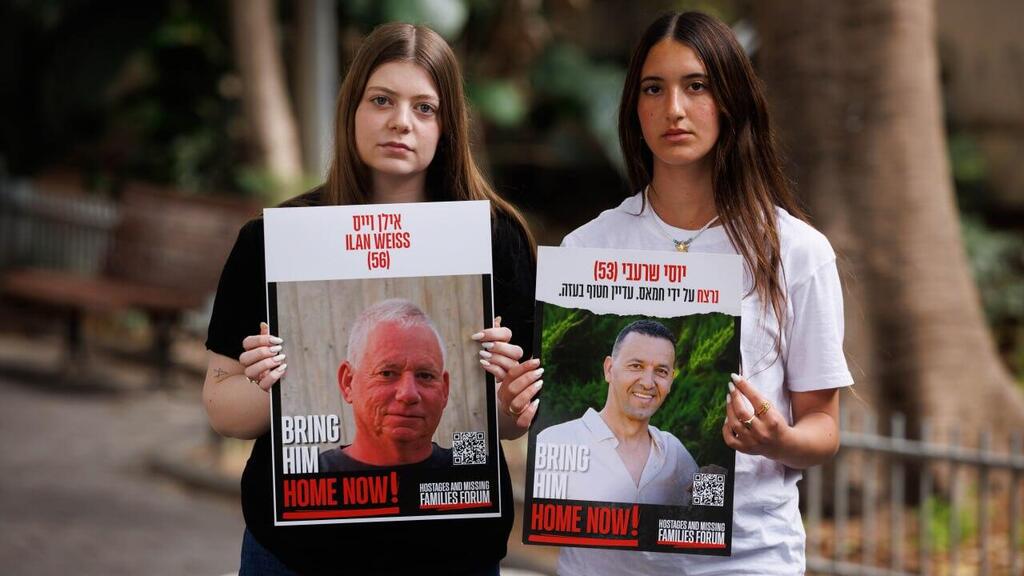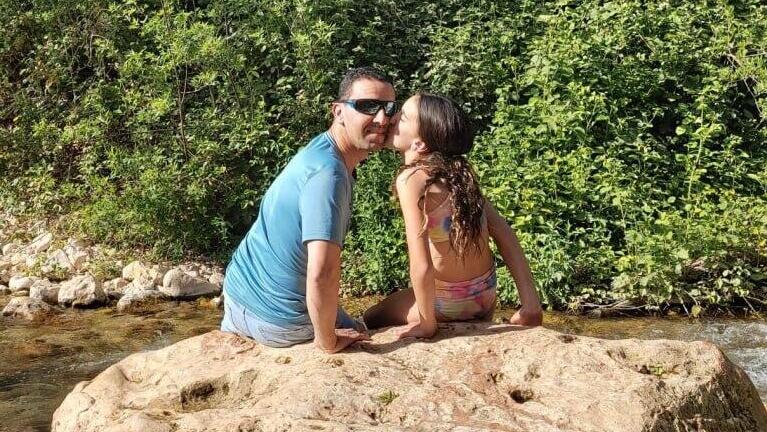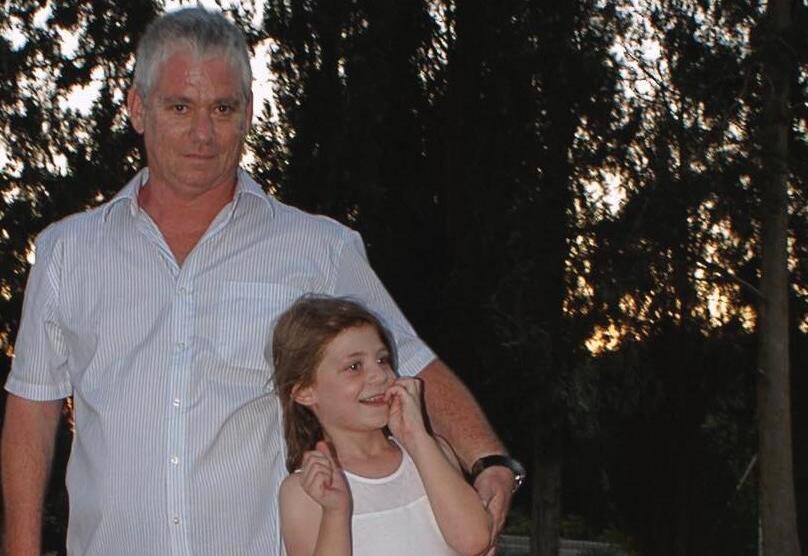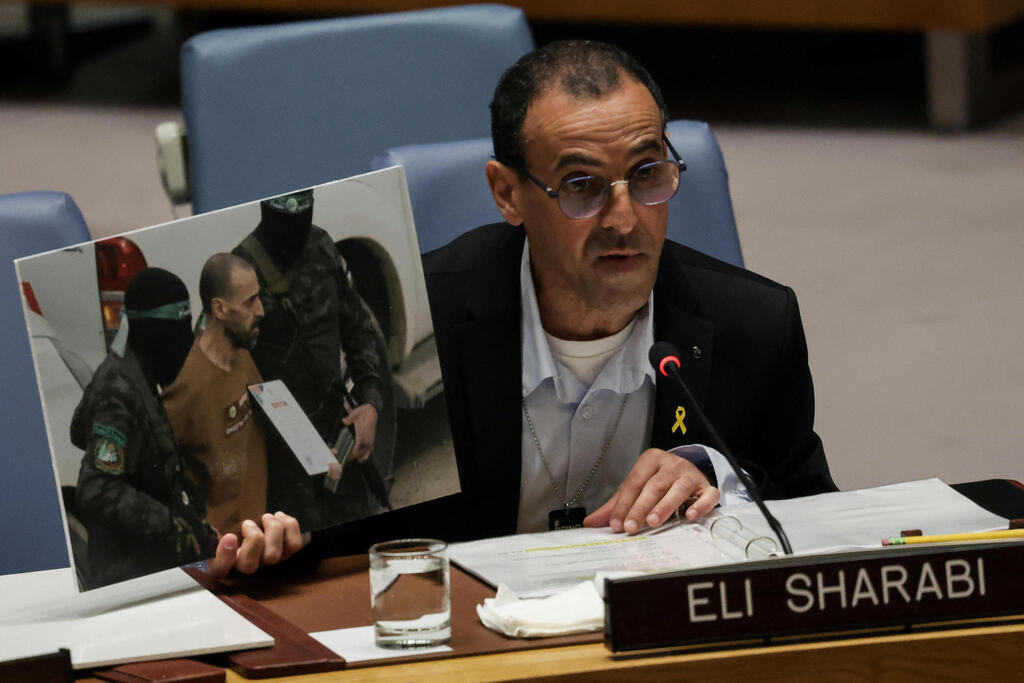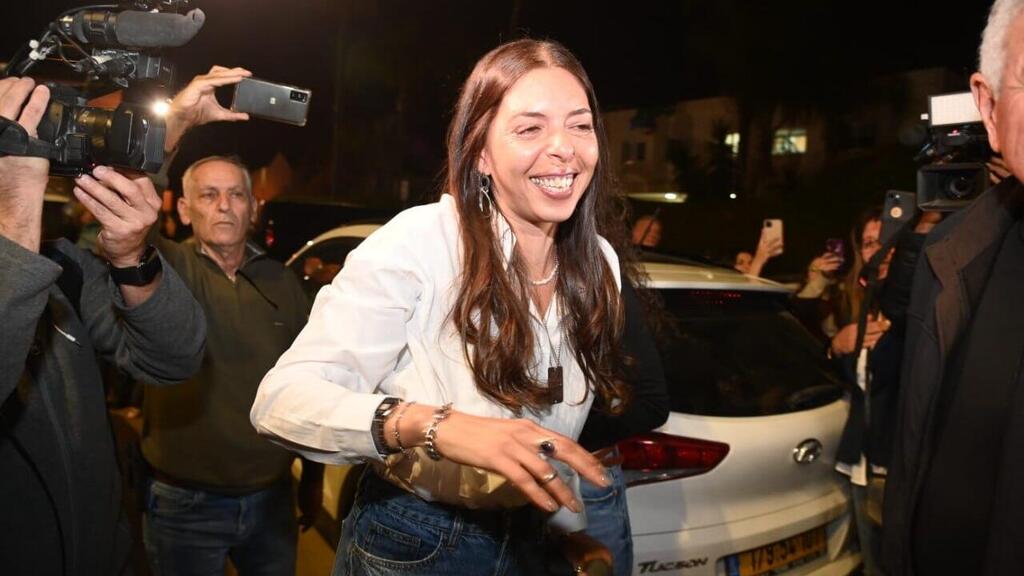Getting your Trinity Audio player ready...
When 16-year-old Ofir Sharabi speaks about her father, Yossi, who was murdered in captivity and whose body remains in Gaza, she does so in the present tense. "My father was kidnapped alive. I saw it with my own eyes. I can't believe anything else because I have no proof. Don't tell me otherwise," she says in a rare interview with Ynet.
Beside her sits 19-year-old Noga Weiss, her childhood friend and fellow Kibbutz Be'eri member. In her first interview since being released from captivity in Gaza, Noga recalls her father, Ilan, who was murdered on October 7 and whose body is also being held in Gaza. "I understand that he's dead but I still hope that one day I'll get a call saying it was a mistake. I'm still waiting for his hug."
A hug — that’s all they want. In a world where the ground has crumbled beneath them, a simple embrace has become an unattainable dream. They share their trauma from October 7, the near-impossible struggle to return to normal life and their urgent plea to bring back their fathers and all the other hostages. "Everything can wait but not this. It's life or death — for them and for us."
‘We've known each other since birth’
That morning, Ofir was at home with her father, Yossi, her mother, Nira, and her sisters, Oren and Yuval. Noga was with her parents, Shiri and Ilan, while her older sisters were in another part of the kibbutz. "We ran to the safe room," Noga recalls.
"Soon after, my father, a member of the local alert squad, was called up. They told him there was a terrorist infiltration and that he needed to open the weapons safe. He said he'd be back in a few minutes and asked us to leave a key outside."
Minutes passed, but he never returned. "After five minutes, he was no longer reachable," Noga says. "We texted him that terrorists were approaching. We thought he would come save us but he never responded. At 10:30 a.m., they broke into our house. My mom told me to hide under the bed. Then they stormed the safe room and took her."
From under the bed, Noga saw everything. "I texted people: 'They're kidnapping my mom.' After they took her, the terrorists stayed in the house and started setting it on fire. The door to the safe room had been forced open and the smoke filled the air — I couldn’t breathe. I decided I'd rather be shot than burn alive. I climbed out the window and saw terrorists and weapons everywhere.
“I tried to hide behind a bush, but one of them spotted me within 10 minutes. He dragged me to a neighbor’s lawn, forced me to sit on the ground and tied my hands behind my back. As we moved, all I saw were bodies. I thought no one was left alive — not even my mom. I kept asking myself when my turn would come. I didn’t understand why they hadn’t shot me yet."
Noga didn’t realize she was being kidnapped. "They put me in a vehicle with the terrorists and we started driving," she says. "I didn't see a single Israeli alive. I thought they were taking me to be executed. I wasn’t afraid of death; I had already accepted it. When my older sisters texted that there was gunfire near their home, I assumed they had been killed. I spent my entire captivity believing I had no family left. Thankfully, they survived."
In Gaza, Noga was taken to a house where she met Moran Stella Yanai. They remained together until Noga’s release, four days before Moran's. On the 14th day of captivity, Noga’s mother was brought to the house where she was held. "When I saw her, I realized I still had family, that I wasn't alone," she recalls. "Even though I was in Gaza, it was the best day of my life."
Get the Ynetnews app on your smartphone: Google Play: https://bit.ly/4eJ37pE | Apple App Store: https://bit.ly/3ZL7iNv
Noga quietly recounts the chilling moment when a terrorist brought her a ring. "Among the guards, one was the most terrifying. When he got angry, he would enter the room with a gun — he was the 'bad cop.' Moran and I noticed that I was the one who had to ask him for things, that he was more attached to me. We would say, 'This is the kind of man who would kill his wife someday.'
“One day, he came to me with a ring and said, 'You're going to marry me, stay in Gaza, bear my children and raise them here. All the hostages will be released but you'll stay because we’ll be married. Israel won’t care about you because they'll think you married me willingly.' I was in shock, panicked, not knowing how to react."
Luckily, he wasn’t there when she was freed. Yet even her release was traumatic — she and Moran were separated without warning. "We insisted on being released together and they told us, 'Yes, yes, of course.' Then, outside the house, they suddenly split us up without a word."
‘Why am I alive?’
During those fateful hours, Ofir lost everything she knew. Her father was kidnapped, her uncle taken as well and her aunt Lian, along with her cousins Yahel and Noya — whom she had grown up with — were murdered. Another cousin, Idan Herman, was murdered at the Nova music festival.
"People don’t understand the trauma we’ve been through and are still living with," Ofir says. "We put everything aside to focus on what matters most — bringing my father home — but we have so much else to deal with. I don’t talk about it much.
“I don’t want people to know my story before they know me, especially now at a new school. But I’m stuck in that day. I can’t even begin to process or heal. My body won’t let me. We want the hostages back not just for them but for us, for our souls, to return to life."
A few weeks ago, her uncle Eli Sharabi was released from captivity. "When he came back, it was incredible but it was bittersweet because for me, it's not over. My father is still there. That puts me in a really difficult place. I carry so much fear. If I see someone who looks like a terrorist, I freeze — I just want to run. And then there’s this thought: Why am I alive?"
Noga shares similar feelings, mourning her uncle Gil and cousin Inbar, who was killed fighting on October 7. "I constantly feel guilt. Why am I alive and they’re not? It never leaves me." Despite her ordeal, Noga chose to enlist in the IDF. "I struggled with the decision," she says.
"After captivity, I didn't think I could stay in Israel. I was afraid, unsure if I could ever feel safe here. But gradually, I realized that to reclaim my life, I needed to follow my plan and enlist. It also feels like a way to help bring the hostages home. My mom supported me — she saw how much I wanted it."
For Ofir, resuming normal life means adjusting to a new school. "I attend, but they expect me to study and I’m just not there. My mind is with my father. Where is he? What’s happening to him? When will he come back? That’s all I think about. I don’t want to be like this — I want to be with friends, to have fun, to focus on my exams."
Ofir clings to hope. "My dad is the most present person in my life — I can’t imagine it without him. You can't not love him. Even the terrorists liked him. He has no bad in him, only good. We shared the same passions.
“He taught me to surf and I keep doing it because that’s where I feel him the most. My biggest fear is that when he returns, I’ll have to face the reality that he’s gone. I won’t accept that thought. I refuse to believe he won’t come back."
Noga feels the same about her father, Ilan. "If he had to choose how to die, it would be this way — defending the kibbutz and our home. He was selfless, always helping others. Even if he knew he was going to die, he would still have done it. I was always a daddy’s girl. If he was around, I felt safe. I would go through everything again just to have grown up with him."



